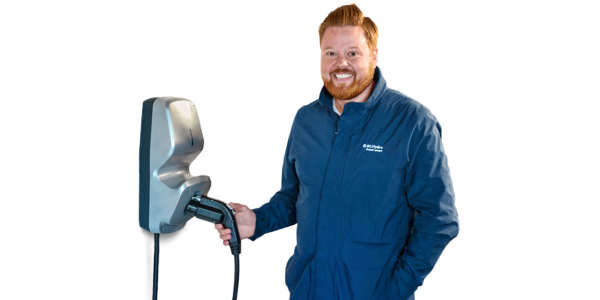Eight steps for a successful installation at your business
Follow the steps below to install an electric vehicle (EV) charger for use by employees at your business. We've also provided some key resources to help you have a smooth ride through the process.
Support to get started
Businesses looking to install EV chargers can get up to five hours of free advice and planning assistance from an expert in EV charging and equipment.
Installation steps
Step 1: Get permission
Unless you have authority over the building, it's likely that you'll have to get permission to install EV chargers.
Step 2: Hire an electrician
Hire a certified electrician, preferably one who has completed the Electric Vehicle Infrastructure Training program. You can find a qualified electrician through our Alliance of Energy Professionals.
Step 3: Select location
Determine where the EV chargers will be installed. If you plan to apply to the EV charger rebate program for funding, be sure to select an eligible EV charger.
Step 4: Check your electrical system
Find out whether the electrical infrastructure in your building can accommodate the EV chargers and make upgrades as needed.
An electrical contractor can do a load calculation using the last 12 months of your meter usage data to determine your structure's electrical capacity available for EV charging.
If you need to upgrade your service, learn about electrical connections and extensions.
Step 5: Rebate pre-approval
If you want to apply for EV charger rebates, submit a pre-approval application for funding towards the purchase and installation of the chargers.
Apply for pre-approval: Rebates for workplace chargers
Step 6: Purchase chargers
Choose and purchase EV chargers that qualify for the rebate. If you're applying for rebates, you need to wait until after you've received pre-approval for funding to purchase and install EV chargers.
See models eligible for charger rebates and choose a networked charger from our database of rebate-eligible chargers for apartments and workplaces.
Know your options: Choosing an EV charger
Step 7: Installation
Install the EV charger. Your electrician will ensure that the necessary permits are obtained and that the work is inspected by your municipality (or Technical Safety BC) upon completion.
Step 8: Rebate application
Gather your documentation and submit your final application for a rebate online.
Workplaces can get a rebate of up to $2,000 per charger to purchase and install eligible Level 2 networked EV chargers for employee use, to a maximum of $14,000. This incentive does not apply to new construction. Pre-approval is required.

How EV chargers add value to your business
Making it appealing for EV drivers to work for you comes with big benefits. By offering EV charging for employees, you will:
- Attract and retain engaged, high-value employees
- Boost the green credibility of your company
- Help to meet any business sustainability goals
By offering chargers for customers who visit your business, you may:
- Bring in new customers who are attracted to businesses that offer a place to charge up
- Encourage customers to stay longer or come back more often


